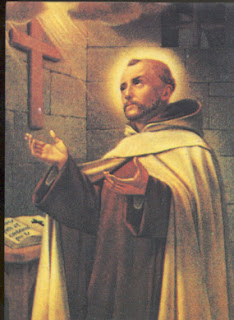December 14 is the feast day of St. John of the Cross (1542-1591), a mystic, reformer, and one of the greatest poets of Spanish literature’s Golden Age.
He was born Juan de Yepes y Alvarez into a converted Jewish family. His father died when he was young and he and his two older brothers, along with their mother, moved from village to village in Castilla, suffering from poverty and rejection by both Jews and Christians.
- At Medina del Campo, from 1559 to 1563, he studied humanities at the Jesuit school.
- In 1563, he entered the Carmelite Order and in 1564, he studied philosophy at the Colegio San Andres at the University of Salamanca.
- In 1567, he was ordained a priest and wanted to join the Carthusians, since he felt called to a life of silent contemplation. St. Theresa of Avila convinced him to help her reform the Carmelites instead.
- St. John of the Cross is a Doctor of the Church
His beatification took place on 25 Jan., 1675, the translation of his body on 21 May of the same year, and the canonization on 27 Dec., 1726.
He left the following works, which for the first time appeared at Barcelona in 1619.
- "The Ascent of Mount Carmel", an explanation of some verses beginning: "In a dark night with anxious love inflamed". This work was to have comprised four books, but breaks off in the middle of the third.
- "The Dark Night of the Soul", another explanation of the same verses, breaking off in the second book. Both these works were written soon after his escape from prison, and, though incomplete, supplement each other, forming a full treatise on mystic theology.
- An explanation of the "Spiritual Canticle", (a paraphrase of the Canticle of Canticles) beginning "Where hast Thou hidden Thyself?" composed part during his imprisonment, and completed and commented upon some years later at the request of Venerable Anne of Jesus.
- An explanation of a poem beginning: "O Living Flame of Love", written about 1584 at the bidding of Doña Ana de Penalosa.
- Some instructions and precautions on matters spiritual.
- Some twenty letters, chiefly to his penitents. Unfortunately the bulk of his correspondence, including numerous letters to and from St. Teresa, was destroyed, partly by himself, partly during the persecutions to which he fell a victim.
- "Poems", of which twenty-six have been hitherto published, viz., twenty in the older editions, and recently six more, discovered partly at the National Library at Madrid, and partly at the convent of Carmelite nuns at Pamplona.
- "A Collection of Spiritual Maxims" (in some editions to the number of one hundred, and in others three hundred and sixty-five) can scarcely count as an independent work, as they are culled from his writings.
SOURCES:
Catholic Encyclopedia

No comments:
Post a Comment